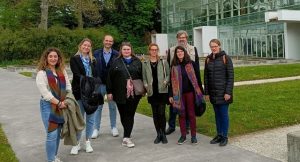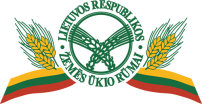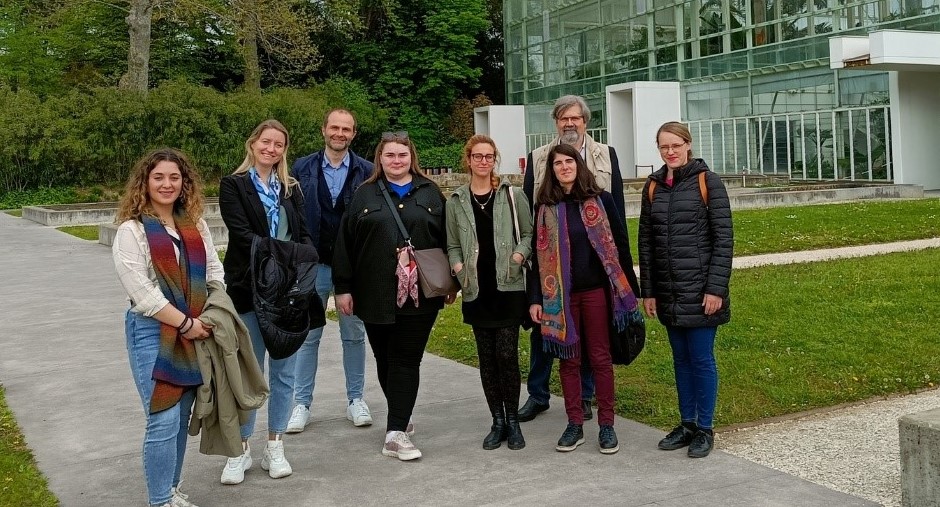On 17-18 April 2023, the final meeting of the partners of the international Erasmus+ project FarmBox took place in Padua, Italy, and was attended by representatives from four countries: the University of Padua (Italy), UptoEarth GmbH (Germany), IKASTEGIA TXORIERRI Vocational Training School (Spain) and the Lithuanian Chamber of Agriculture.
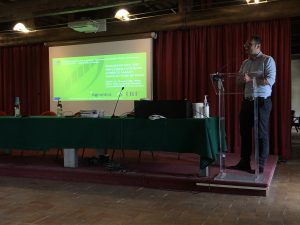
Objectives of the FarmBox Profect
The agricultural sector employs around 22.2 million people, but there is a shortage of the next generation of workers and farmers. Today’s agriculture is particularly challenged to work sustainably, to produce quality food while protecting the environment, to respond adequately to climate change, to meet society’s needs for a healthy and balanced diet, and to keep up with the ever-increasing pace of advances in science and technology. It is therefore important that education and continuous training(s) are available to future farmers and farm workers to ensure that they have the necessary knowledge and skills to adapt to a changing environment.
The four national project partners developed training content on climate-smart agriculture, providing background information and useful practices on how to improve farm management practices, taking into account the principles of biodiversity and adapting to the needs of climate change.
Meeting at the University of Padua, one of Europe’s oldest and most famous universities
The meeting of the project partners started in a unique location – the Padua Botanical Garden (Italian: Orto botanico di Padova). Founded in 1545, it is one of the oldest botanical gardens in the world, preserved on its original site. It belongs to the University of Padua, which is also one of the oldest and most famous universities in Europe (founded in 1222) and covers an area of more than 22 000 m2. In 1997, the Botanical Garden was inscribed on the UNESCO World Heritage List. As well as rare plant species, the Botanical Garden is also famous for having the oldest trees in Europe, including a palm tree dating back to 1585, an 18th-century ginkgo tree and a magnolia. Today, the university is moving towards innovation, collaborating with other scientific and educational institutions, and carrying out commissioned research that is applied in practice.
Results of the last project partner meeting
The last meeting of the Erasmus+ project discussed all the work that has been done: methodological materials, presentations, explanations on how to use the simulator and the final work plan, and reviewed and discussed the process of the development of the Climate Smart Agriculture (CSA) simulator, and the benefits it will bring to its future users – future farmers, students, experts, and maybe even consultants.
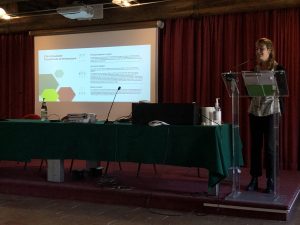
Final conference
18 April 2023 The final conference of the FarmBox project “Let’s be smarter for a greener tomorrow” took place at Padua University.
“The conference showcased the joint work carried out by all four partners – the Climate Smart Farming Simulator and its principles and perspectives for use. A number of presentations focused on the presentation of new approaches and opportunities that can help mitigate climate change. Looking to the future, and in order to successfully tackle climate change, the agricultural sector will need to attract a new generation of farmers with the right skills and competences and the ability to work in challenging conditions. Future farmers face new challenges – to grow products more efficiently but in a sustainable way, to contribute to the fight against climate change, to meet consumers’ needs for healthy and safe produce, and to keep up with rapid advances in science and technology. It is therefore crucial that future farmers receive appropriate agricultural education and quality training based on science, which they can apply on their farms,” said Ms Ernesta Dekaminavičienė, Senior Specialist at the Rural Development and Information Division of the CARL, sharing her impressions of the conference.
The participants not only exchanged information and views on the project activities and outcome, but also exchanged contacts that are likely to be useful for future projects.
The Italian case study focused on a simulator developed during the project, which allows simulating agricultural activities and their impact on soil quality and climate in a virtual environment. The presentation of the simulator was given by Martina Monaldi, a teacher from the partner Uptoearth GmbH, who throughout the project was responsible for the synchronisation of the simulator and the training system, the collection of the data and the coordination of the partners in the preparation of the tasks to be integrated in the simulator. Professor Francesco Marinello of the University of Padua, who was responsible for the development and integration of the system in the Eduopen training platform, stressed the importance of learning.
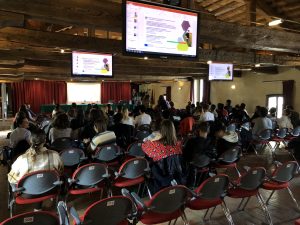
The day also included discussion sessions on the impact of European agriculture on the climate. The panel included Davide Cammarano, researcher at AARHUS University, Riccardo Soldan, climate risk and data analyst at FAO, and Mathieu Nogues, SCARF and ORCaSa coordinator. Each panellist presented their organisation’s approach to climate change and gave insights into how projects and tools such as Farmbox can contribute to climate change mitigation.
The second panel discussion focused on the Roadmap for Climate Smart Agriculture in Italy. The panel featured Veneto Ageicultura researcher Lorenzo Furlan, IBF Research Officer Donato Cillis, and agronomists Marco Benetti and Tommaso Gaifami, who shared best practices and their insights on how each of us can contribute to mitigating climate change.
The CHARL was represented by Ina Kalėdienė, Head of the Projects Division, Viktorija Bujauskė and Ernesta Dekaminavičienė, Senior Specialists of the Rural Development and Information Division.
